How FGM Affects Health and Well-being of Guinea Bissau Women
VerifiedAdded on 2020/10/22
|23
|11103
|432
Thesis and Dissertation
AI Summary
This dissertation investigates the impact of Female Genital Mutilation (FGM) on the health and well-being of women aged 18-35 from Guinea Bissau living in London. The study explores the physical and psychological consequences of FGM, including infections, pain, difficulties in childbirth, and mental health issues. It examines the prevalence of FGM, its historical context, and the cultural factors that influence its practice. The research also assesses the strategies and actions taken by the UK government to prevent FGM and highlights the available healthcare services for affected women. The dissertation aims to analyze the specific challenges faced by this demographic, the long-term health issues associated with FGM, and the quality of support services available, drawing on both statistical evidence and relevant literature to provide a comprehensive overview of the issue and its impact on the lives of these women.
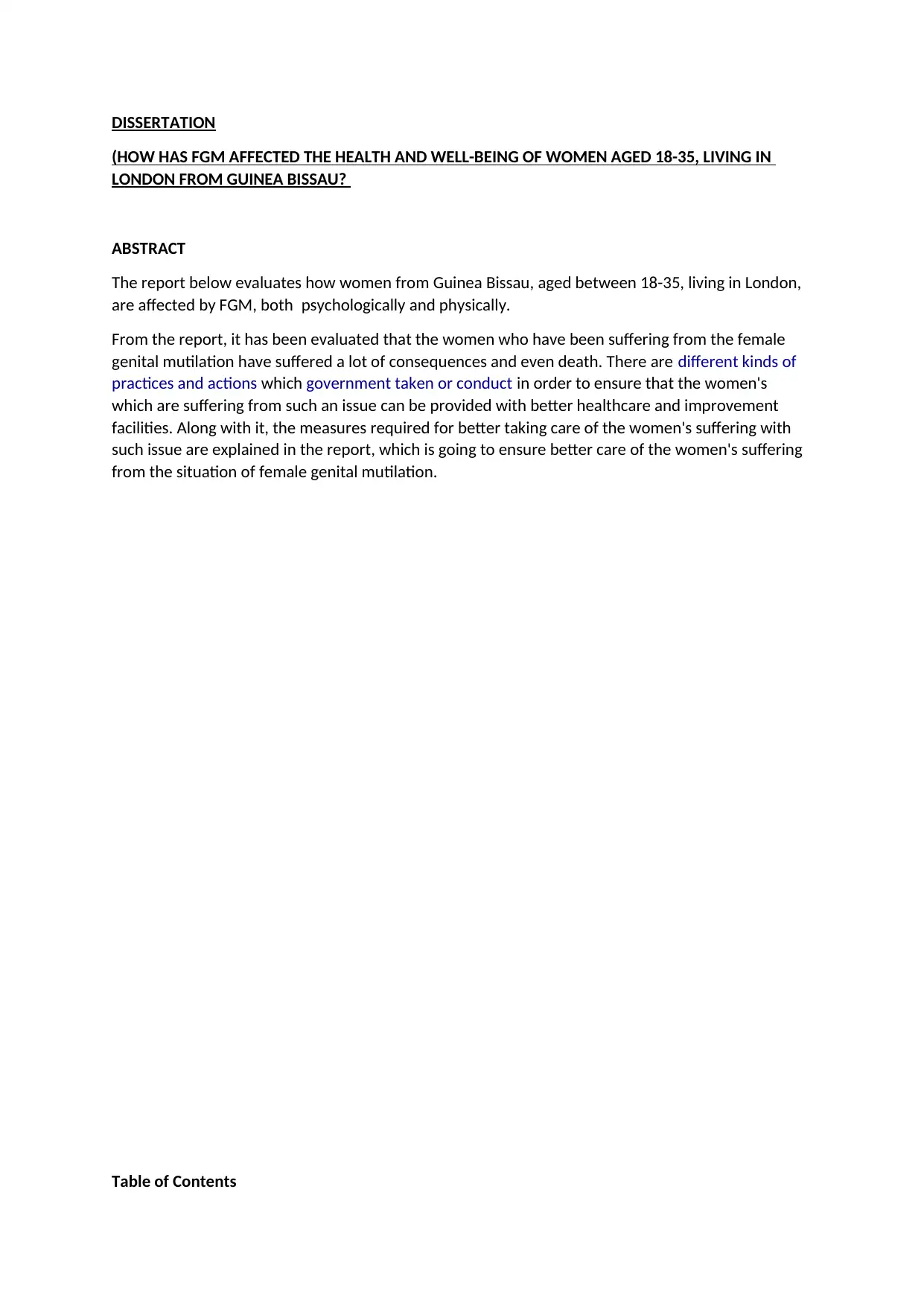
DISSERTATION
(HOW HAS FGM AFFECTED THE HEALTH AND WELL-BEING OF WOMEN AGED 18-35, LIVING IN
LONDON FROM GUINEA BISSAU?
ABSTRACT
The report below evaluates how women from Guinea Bissau, aged between 18-35, living in London,
are affected by FGM, both psychologically and physically.
From the report, it has been evaluated that the women who have been suffering from the female
genital mutilation have suffered a lot of consequences and even death. There are different kinds of
practices and actions which government taken or conduct in order to ensure that the women's
which are suffering from such an issue can be provided with better healthcare and improvement
facilities. Along with it, the measures required for better taking care of the women's suffering with
such issue are explained in the report, which is going to ensure better care of the women's suffering
from the situation of female genital mutilation.
Table of Contents
(HOW HAS FGM AFFECTED THE HEALTH AND WELL-BEING OF WOMEN AGED 18-35, LIVING IN
LONDON FROM GUINEA BISSAU?
ABSTRACT
The report below evaluates how women from Guinea Bissau, aged between 18-35, living in London,
are affected by FGM, both psychologically and physically.
From the report, it has been evaluated that the women who have been suffering from the female
genital mutilation have suffered a lot of consequences and even death. There are different kinds of
practices and actions which government taken or conduct in order to ensure that the women's
which are suffering from such an issue can be provided with better healthcare and improvement
facilities. Along with it, the measures required for better taking care of the women's suffering with
such issue are explained in the report, which is going to ensure better care of the women's suffering
from the situation of female genital mutilation.
Table of Contents
Paraphrase This Document
Need a fresh take? Get an instant paraphrase of this document with our AI Paraphraser
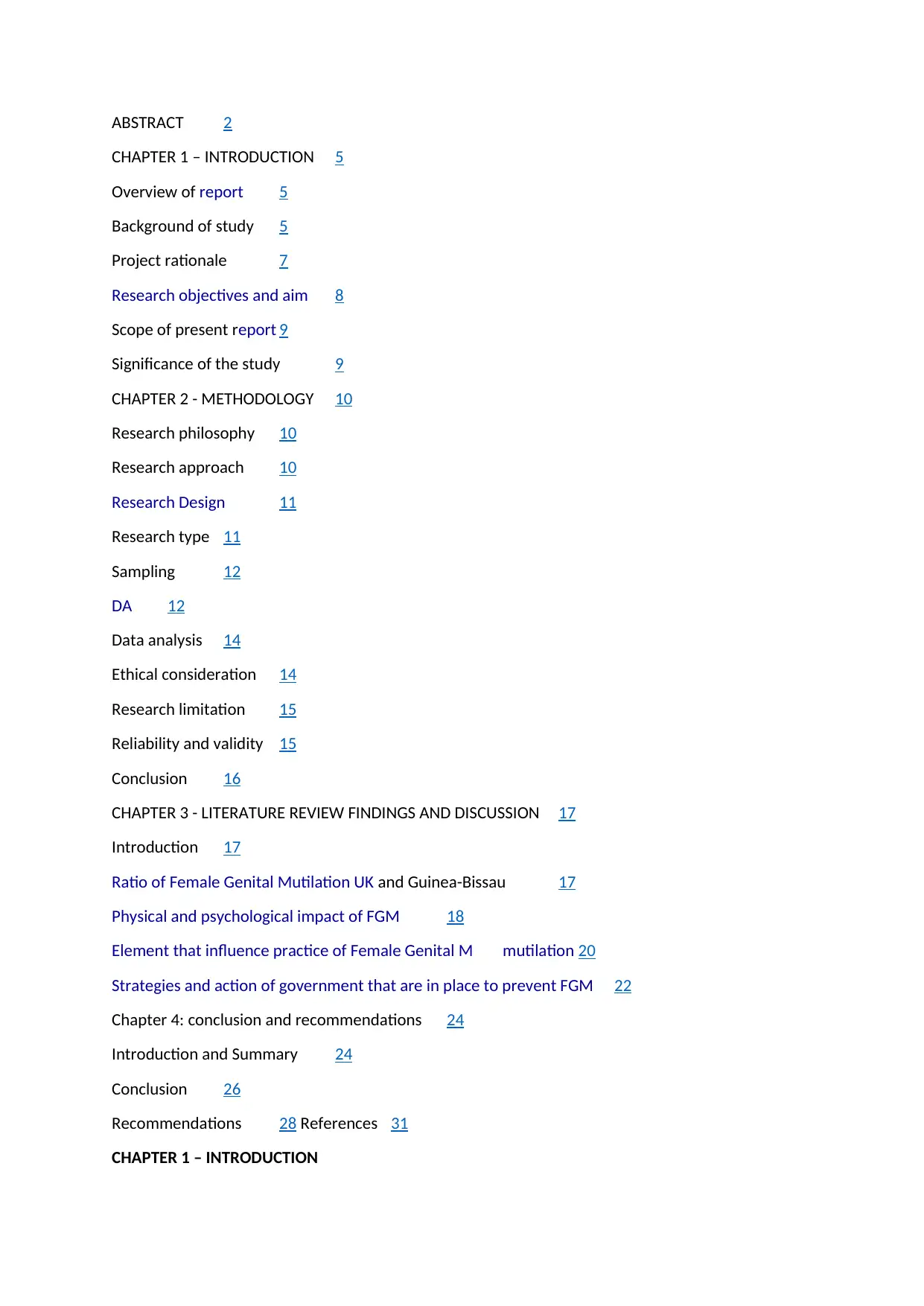
ABSTRACT 2
CHAPTER 1 – INTRODUCTION 5
Overview of report 5
Background of study 5
Project rationale 7
Research objectives and aim 8
Scope of present report 9
Significance of the study 9
CHAPTER 2 - METHODOLOGY 10
Research philosophy 10
Research approach 10
Research Design 11
Research type 11
Sampling 12
DA 12
Data analysis 14
Ethical consideration 14
Research limitation 15
Reliability and validity 15
Conclusion 16
CHAPTER 3 - LITERATURE REVIEW FINDINGS AND DISCUSSION 17
Introduction 17
Ratio of Female Genital Mutilation UK and Guinea-Bissau 17
Physical and psychological impact of FGM 18
Element that influence practice of Female Genital M mutilation 20
Strategies and action of government that are in place to prevent FGM 22
Chapter 4: conclusion and recommendations 24
Introduction and Summary 24
Conclusion 26
Recommendations 28 References 31
CHAPTER 1 – INTRODUCTION
CHAPTER 1 – INTRODUCTION 5
Overview of report 5
Background of study 5
Project rationale 7
Research objectives and aim 8
Scope of present report 9
Significance of the study 9
CHAPTER 2 - METHODOLOGY 10
Research philosophy 10
Research approach 10
Research Design 11
Research type 11
Sampling 12
DA 12
Data analysis 14
Ethical consideration 14
Research limitation 15
Reliability and validity 15
Conclusion 16
CHAPTER 3 - LITERATURE REVIEW FINDINGS AND DISCUSSION 17
Introduction 17
Ratio of Female Genital Mutilation UK and Guinea-Bissau 17
Physical and psychological impact of FGM 18
Element that influence practice of Female Genital M mutilation 20
Strategies and action of government that are in place to prevent FGM 22
Chapter 4: conclusion and recommendations 24
Introduction and Summary 24
Conclusion 26
Recommendations 28 References 31
CHAPTER 1 – INTRODUCTION
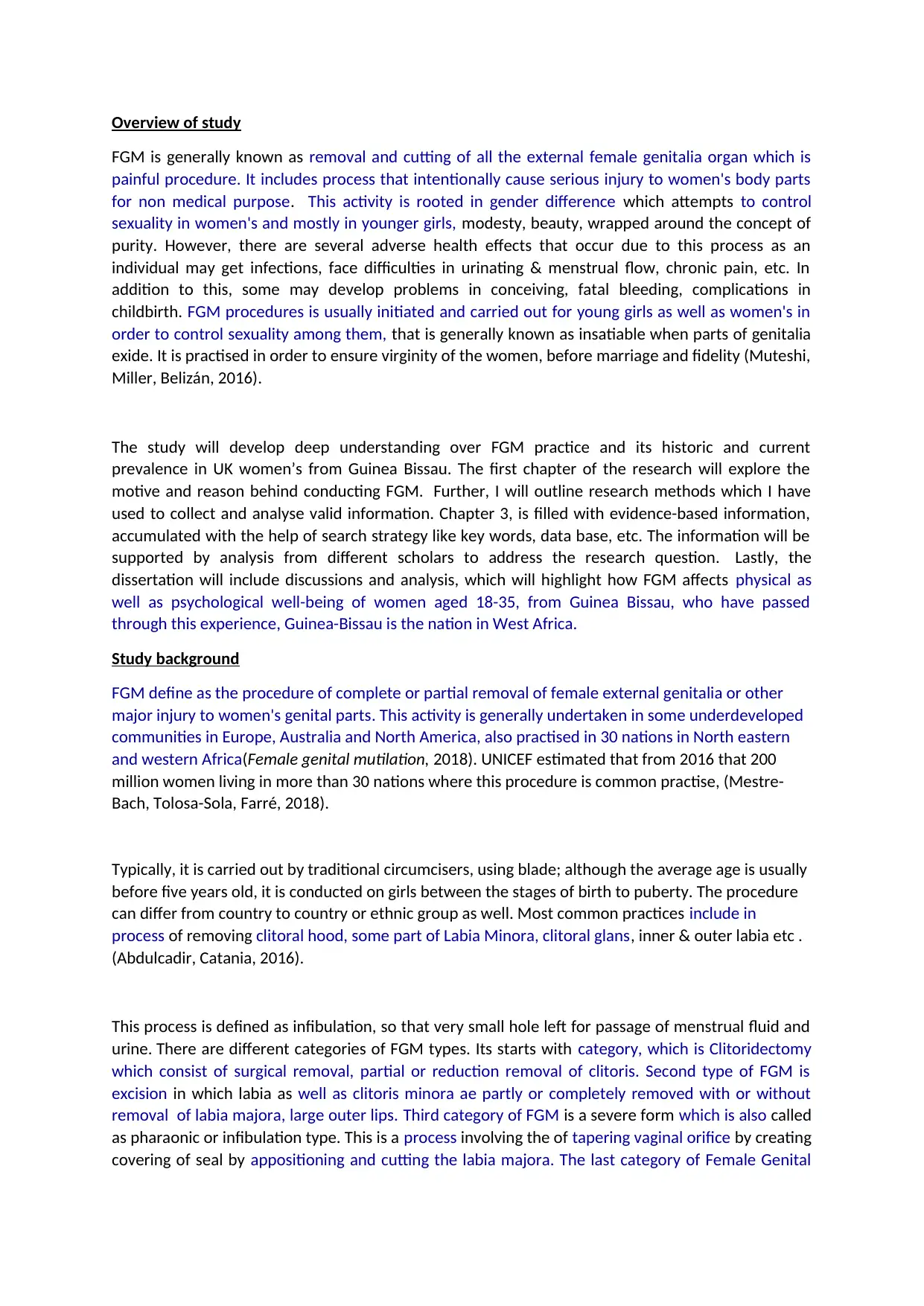
Overview of study
FGM is generally known as removal and cutting of all the external female genitalia organ which is
painful procedure. It includes process that intentionally cause serious injury to women's body parts
for non medical purpose. This activity is rooted in gender difference which attempts to control
sexuality in women's and mostly in younger girls, modesty, beauty, wrapped around the concept of
purity. However, there are several adverse health effects that occur due to this process as an
individual may get infections, face difficulties in urinating & menstrual flow, chronic pain, etc. In
addition to this, some may develop problems in conceiving, fatal bleeding, complications in
childbirth. FGM procedures is usually initiated and carried out for young girls as well as women's in
order to control sexuality among them, that is generally known as insatiable when parts of genitalia
exide. It is practised in order to ensure virginity of the women, before marriage and fidelity (Muteshi,
Miller, Belizán, 2016).
The study will develop deep understanding over FGM practice and its historic and current
prevalence in UK women’s from Guinea Bissau. The first chapter of the research will explore the
motive and reason behind conducting FGM. Further, I will outline research methods which I have
used to collect and analyse valid information. Chapter 3, is filled with evidence-based information,
accumulated with the help of search strategy like key words, data base, etc. The information will be
supported by analysis from different scholars to address the research question. Lastly, the
dissertation will include discussions and analysis, which will highlight how FGM affects physical as
well as psychological well-being of women aged 18-35, from Guinea Bissau, who have passed
through this experience, Guinea-Bissau is the nation in West Africa.
Study background
FGM define as the procedure of complete or partial removal of female external genitalia or other
major injury to women's genital parts. This activity is generally undertaken in some underdeveloped
communities in Europe, Australia and North America, also practised in 30 nations in North eastern
and western Africa(Female genital mutilation, 2018). UNICEF estimated that from 2016 that 200
million women living in more than 30 nations where this procedure is common practise, (Mestre-
Bach, Tolosa-Sola, Farré, 2018).
Typically, it is carried out by traditional circumcisers, using blade; although the average age is usually
before five years old, it is conducted on girls between the stages of birth to puberty. The procedure
can differ from country to country or ethnic group as well. Most common practices include in
process of removing clitoral hood, some part of Labia Minora, clitoral glans, inner & outer labia etc .
(Abdulcadir, Catania, 2016).
This process is defined as infibulation, so that very small hole left for passage of menstrual fluid and
urine. There are different categories of FGM types. Its starts with category, which is Clitoridectomy
which consist of surgical removal, partial or reduction removal of clitoris. Second type of FGM is
excision in which labia as well as clitoris minora ae partly or completely removed with or without
removal of labia majora, large outer lips. Third category of FGM is a severe form which is also called
as pharaonic or infibulation type. This is a process involving the of tapering vaginal orifice by creating
covering of seal by appositioning and cutting the labia majora. The last category of Female Genital
FGM is generally known as removal and cutting of all the external female genitalia organ which is
painful procedure. It includes process that intentionally cause serious injury to women's body parts
for non medical purpose. This activity is rooted in gender difference which attempts to control
sexuality in women's and mostly in younger girls, modesty, beauty, wrapped around the concept of
purity. However, there are several adverse health effects that occur due to this process as an
individual may get infections, face difficulties in urinating & menstrual flow, chronic pain, etc. In
addition to this, some may develop problems in conceiving, fatal bleeding, complications in
childbirth. FGM procedures is usually initiated and carried out for young girls as well as women's in
order to control sexuality among them, that is generally known as insatiable when parts of genitalia
exide. It is practised in order to ensure virginity of the women, before marriage and fidelity (Muteshi,
Miller, Belizán, 2016).
The study will develop deep understanding over FGM practice and its historic and current
prevalence in UK women’s from Guinea Bissau. The first chapter of the research will explore the
motive and reason behind conducting FGM. Further, I will outline research methods which I have
used to collect and analyse valid information. Chapter 3, is filled with evidence-based information,
accumulated with the help of search strategy like key words, data base, etc. The information will be
supported by analysis from different scholars to address the research question. Lastly, the
dissertation will include discussions and analysis, which will highlight how FGM affects physical as
well as psychological well-being of women aged 18-35, from Guinea Bissau, who have passed
through this experience, Guinea-Bissau is the nation in West Africa.
Study background
FGM define as the procedure of complete or partial removal of female external genitalia or other
major injury to women's genital parts. This activity is generally undertaken in some underdeveloped
communities in Europe, Australia and North America, also practised in 30 nations in North eastern
and western Africa(Female genital mutilation, 2018). UNICEF estimated that from 2016 that 200
million women living in more than 30 nations where this procedure is common practise, (Mestre-
Bach, Tolosa-Sola, Farré, 2018).
Typically, it is carried out by traditional circumcisers, using blade; although the average age is usually
before five years old, it is conducted on girls between the stages of birth to puberty. The procedure
can differ from country to country or ethnic group as well. Most common practices include in
process of removing clitoral hood, some part of Labia Minora, clitoral glans, inner & outer labia etc .
(Abdulcadir, Catania, 2016).
This process is defined as infibulation, so that very small hole left for passage of menstrual fluid and
urine. There are different categories of FGM types. Its starts with category, which is Clitoridectomy
which consist of surgical removal, partial or reduction removal of clitoris. Second type of FGM is
excision in which labia as well as clitoris minora ae partly or completely removed with or without
removal of labia majora, large outer lips. Third category of FGM is a severe form which is also called
as pharaonic or infibulation type. This is a process involving the of tapering vaginal orifice by creating
covering of seal by appositioning and cutting the labia majora. The last category of Female Genital
⊘ This is a preview!⊘
Do you want full access?
Subscribe today to unlock all pages.

Trusted by 1+ million students worldwide
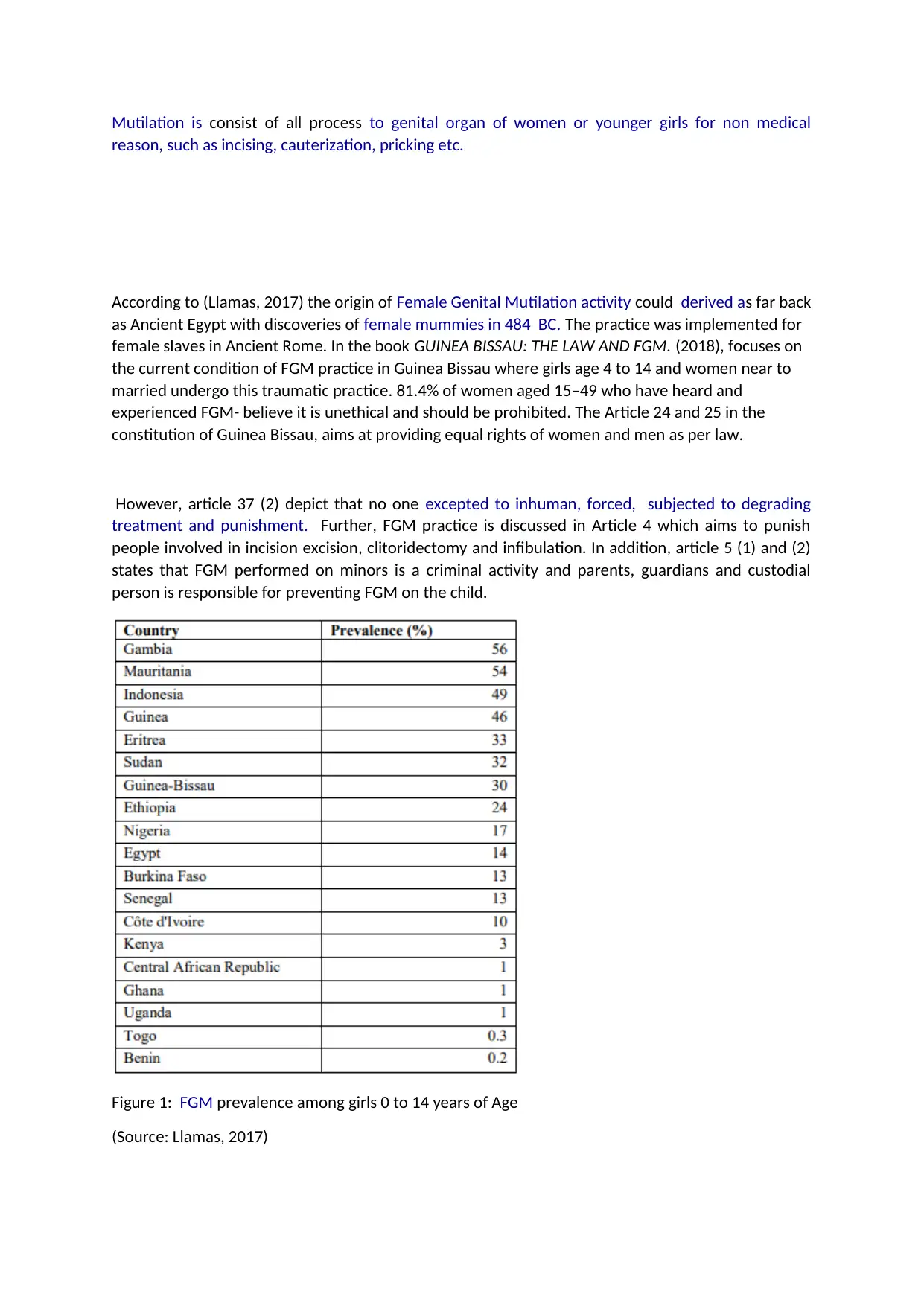
Mutilation is consist of all process to genital organ of women or younger girls for non medical
reason, such as incising, cauterization, pricking etc.
According to (Llamas, 2017) the origin of Female Genital Mutilation activity could derived as far back
as Ancient Egypt with discoveries of female mummies in 484 BC. The practice was implemented for
female slaves in Ancient Rome. In the book GUINEA BISSAU: THE LAW AND FGM. (2018), focuses on
the current condition of FGM practice in Guinea Bissau where girls age 4 to 14 and women near to
married undergo this traumatic practice. 81.4% of women aged 15–49 who have heard and
experienced FGM- believe it is unethical and should be prohibited. The Article 24 and 25 in the
constitution of Guinea Bissau, aims at providing equal rights of women and men as per law.
However, article 37 (2) depict that no one excepted to inhuman, forced, subjected to degrading
treatment and punishment. Further, FGM practice is discussed in Article 4 which aims to punish
people involved in incision excision, clitoridectomy and infibulation. In addition, article 5 (1) and (2)
states that FGM performed on minors is a criminal activity and parents, guardians and custodial
person is responsible for preventing FGM on the child.
Figure 1: FGM prevalence among girls 0 to 14 years of Age
(Source: Llamas, 2017)
reason, such as incising, cauterization, pricking etc.
According to (Llamas, 2017) the origin of Female Genital Mutilation activity could derived as far back
as Ancient Egypt with discoveries of female mummies in 484 BC. The practice was implemented for
female slaves in Ancient Rome. In the book GUINEA BISSAU: THE LAW AND FGM. (2018), focuses on
the current condition of FGM practice in Guinea Bissau where girls age 4 to 14 and women near to
married undergo this traumatic practice. 81.4% of women aged 15–49 who have heard and
experienced FGM- believe it is unethical and should be prohibited. The Article 24 and 25 in the
constitution of Guinea Bissau, aims at providing equal rights of women and men as per law.
However, article 37 (2) depict that no one excepted to inhuman, forced, subjected to degrading
treatment and punishment. Further, FGM practice is discussed in Article 4 which aims to punish
people involved in incision excision, clitoridectomy and infibulation. In addition, article 5 (1) and (2)
states that FGM performed on minors is a criminal activity and parents, guardians and custodial
person is responsible for preventing FGM on the child.
Figure 1: FGM prevalence among girls 0 to 14 years of Age
(Source: Llamas, 2017)
Paraphrase This Document
Need a fresh take? Get an instant paraphrase of this document with our AI Paraphraser
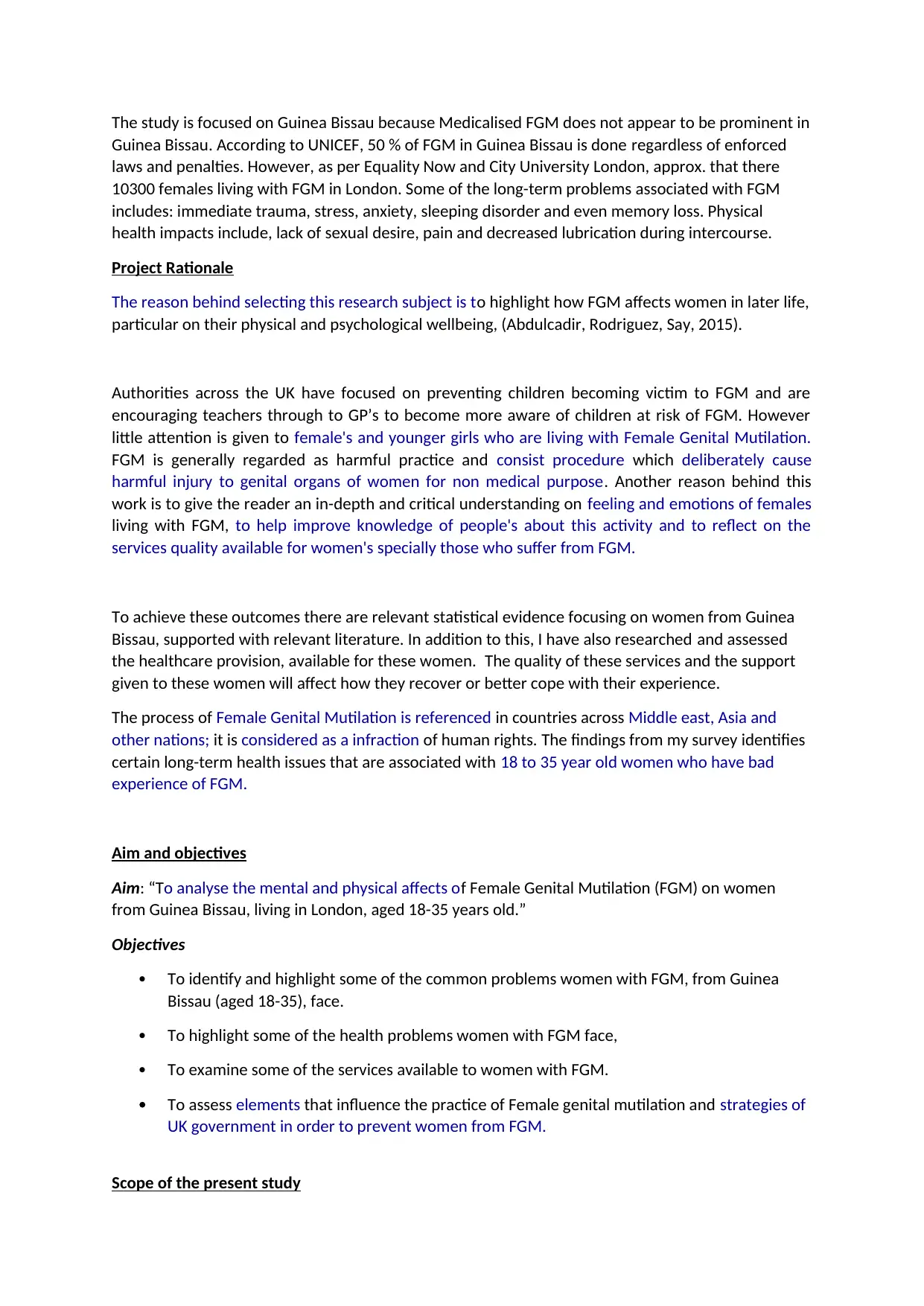
The study is focused on Guinea Bissau because Medicalised FGM does not appear to be prominent in
Guinea Bissau. According to UNICEF, 50 % of FGM in Guinea Bissau is done regardless of enforced
laws and penalties. However, as per Equality Now and City University London, approx. that there
10300 females living with FGM in London. Some of the long-term problems associated with FGM
includes: immediate trauma, stress, anxiety, sleeping disorder and even memory loss. Physical
health impacts include, lack of sexual desire, pain and decreased lubrication during intercourse.
Project Rationale
The reason behind selecting this research subject is to highlight how FGM affects women in later life,
particular on their physical and psychological wellbeing, (Abdulcadir, Rodriguez, Say, 2015).
Authorities across the UK have focused on preventing children becoming victim to FGM and are
encouraging teachers through to GP’s to become more aware of children at risk of FGM. However
little attention is given to female's and younger girls who are living with Female Genital Mutilation.
FGM is generally regarded as harmful practice and consist procedure which deliberately cause
harmful injury to genital organs of women for non medical purpose. Another reason behind this
work is to give the reader an in-depth and critical understanding on feeling and emotions of females
living with FGM, to help improve knowledge of people's about this activity and to reflect on the
services quality available for women's specially those who suffer from FGM.
To achieve these outcomes there are relevant statistical evidence focusing on women from Guinea
Bissau, supported with relevant literature. In addition to this, I have also researched and assessed
the healthcare provision, available for these women. The quality of these services and the support
given to these women will affect how they recover or better cope with their experience.
The process of Female Genital Mutilation is referenced in countries across Middle east, Asia and
other nations; it is considered as a infraction of human rights. The findings from my survey identifies
certain long-term health issues that are associated with 18 to 35 year old women who have bad
experience of FGM.
Aim and objectives
Aim: “To analyse the mental and physical affects of Female Genital Mutilation (FGM) on women
from Guinea Bissau, living in London, aged 18-35 years old.”
Objectives
To identify and highlight some of the common problems women with FGM, from Guinea
Bissau (aged 18-35), face.
To highlight some of the health problems women with FGM face,
To examine some of the services available to women with FGM.
To assess elements that influence the practice of Female genital mutilation and strategies of
UK government in order to prevent women from FGM.
Scope of the present study
Guinea Bissau. According to UNICEF, 50 % of FGM in Guinea Bissau is done regardless of enforced
laws and penalties. However, as per Equality Now and City University London, approx. that there
10300 females living with FGM in London. Some of the long-term problems associated with FGM
includes: immediate trauma, stress, anxiety, sleeping disorder and even memory loss. Physical
health impacts include, lack of sexual desire, pain and decreased lubrication during intercourse.
Project Rationale
The reason behind selecting this research subject is to highlight how FGM affects women in later life,
particular on their physical and psychological wellbeing, (Abdulcadir, Rodriguez, Say, 2015).
Authorities across the UK have focused on preventing children becoming victim to FGM and are
encouraging teachers through to GP’s to become more aware of children at risk of FGM. However
little attention is given to female's and younger girls who are living with Female Genital Mutilation.
FGM is generally regarded as harmful practice and consist procedure which deliberately cause
harmful injury to genital organs of women for non medical purpose. Another reason behind this
work is to give the reader an in-depth and critical understanding on feeling and emotions of females
living with FGM, to help improve knowledge of people's about this activity and to reflect on the
services quality available for women's specially those who suffer from FGM.
To achieve these outcomes there are relevant statistical evidence focusing on women from Guinea
Bissau, supported with relevant literature. In addition to this, I have also researched and assessed
the healthcare provision, available for these women. The quality of these services and the support
given to these women will affect how they recover or better cope with their experience.
The process of Female Genital Mutilation is referenced in countries across Middle east, Asia and
other nations; it is considered as a infraction of human rights. The findings from my survey identifies
certain long-term health issues that are associated with 18 to 35 year old women who have bad
experience of FGM.
Aim and objectives
Aim: “To analyse the mental and physical affects of Female Genital Mutilation (FGM) on women
from Guinea Bissau, living in London, aged 18-35 years old.”
Objectives
To identify and highlight some of the common problems women with FGM, from Guinea
Bissau (aged 18-35), face.
To highlight some of the health problems women with FGM face,
To examine some of the services available to women with FGM.
To assess elements that influence the practice of Female genital mutilation and strategies of
UK government in order to prevent women from FGM.
Scope of the present study
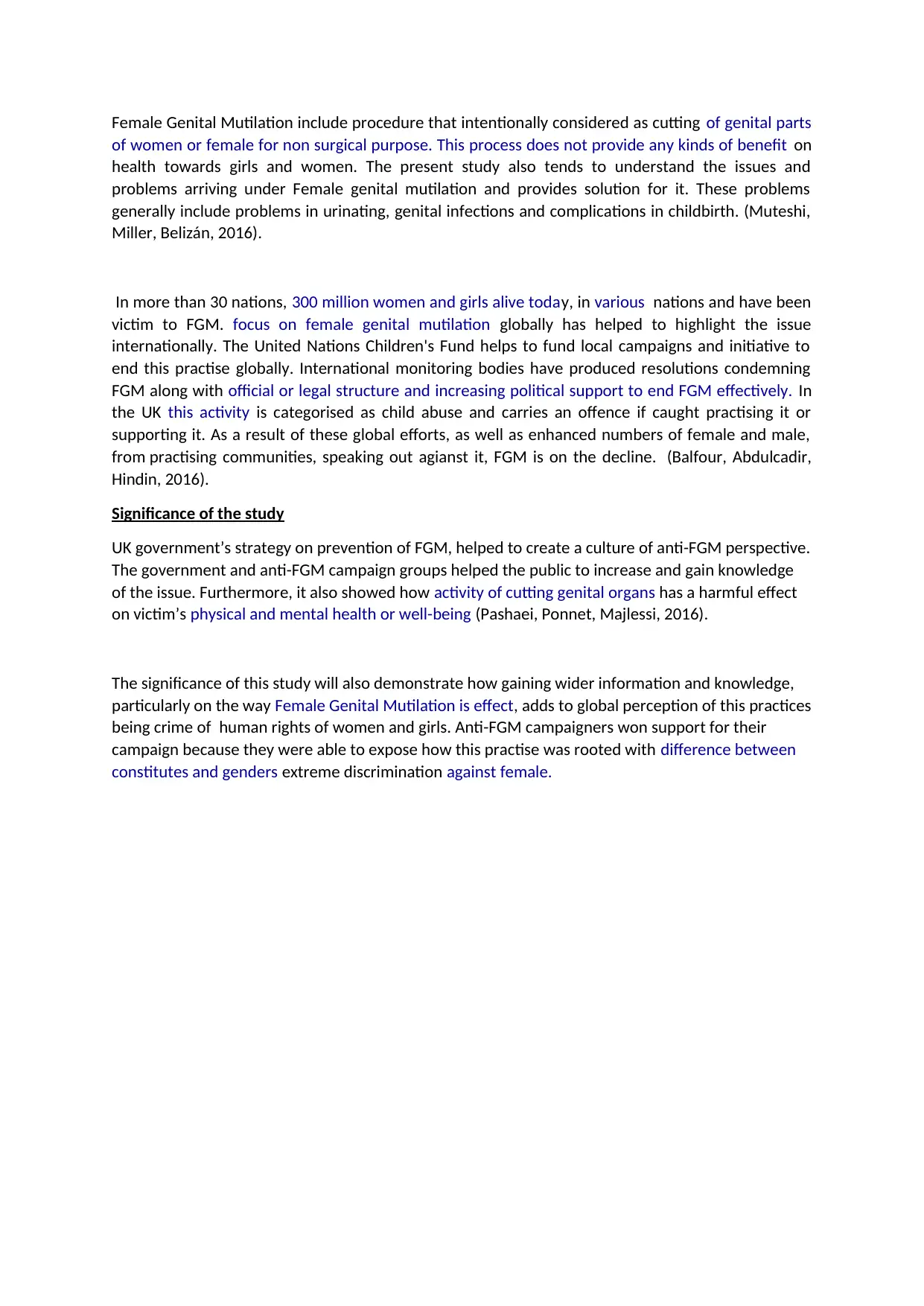
Female Genital Mutilation include procedure that intentionally considered as cutting of genital parts
of women or female for non surgical purpose. This process does not provide any kinds of benefit on
health towards girls and women. The present study also tends to understand the issues and
problems arriving under Female genital mutilation and provides solution for it. These problems
generally include problems in urinating, genital infections and complications in childbirth. (Muteshi,
Miller, Belizán, 2016).
In more than 30 nations, 300 million women and girls alive today, in various nations and have been
victim to FGM. focus on female genital mutilation globally has helped to highlight the issue
internationally. The United Nations Children's Fund helps to fund local campaigns and initiative to
end this practise globally. International monitoring bodies have produced resolutions condemning
FGM along with official or legal structure and increasing political support to end FGM effectively. In
the UK this activity is categorised as child abuse and carries an offence if caught practising it or
supporting it. As a result of these global efforts, as well as enhanced numbers of female and male,
from practising communities, speaking out agianst it, FGM is on the decline. (Balfour, Abdulcadir,
Hindin, 2016).
Significance of the study
UK government’s strategy on prevention of FGM, helped to create a culture of anti-FGM perspective.
The government and anti-FGM campaign groups helped the public to increase and gain knowledge
of the issue. Furthermore, it also showed how activity of cutting genital organs has a harmful effect
on victim’s physical and mental health or well-being (Pashaei, Ponnet, Majlessi, 2016).
The significance of this study will also demonstrate how gaining wider information and knowledge,
particularly on the way Female Genital Mutilation is effect, adds to global perception of this practices
being crime of human rights of women and girls. Anti-FGM campaigners won support for their
campaign because they were able to expose how this practise was rooted with difference between
constitutes and genders extreme discrimination against female.
of women or female for non surgical purpose. This process does not provide any kinds of benefit on
health towards girls and women. The present study also tends to understand the issues and
problems arriving under Female genital mutilation and provides solution for it. These problems
generally include problems in urinating, genital infections and complications in childbirth. (Muteshi,
Miller, Belizán, 2016).
In more than 30 nations, 300 million women and girls alive today, in various nations and have been
victim to FGM. focus on female genital mutilation globally has helped to highlight the issue
internationally. The United Nations Children's Fund helps to fund local campaigns and initiative to
end this practise globally. International monitoring bodies have produced resolutions condemning
FGM along with official or legal structure and increasing political support to end FGM effectively. In
the UK this activity is categorised as child abuse and carries an offence if caught practising it or
supporting it. As a result of these global efforts, as well as enhanced numbers of female and male,
from practising communities, speaking out agianst it, FGM is on the decline. (Balfour, Abdulcadir,
Hindin, 2016).
Significance of the study
UK government’s strategy on prevention of FGM, helped to create a culture of anti-FGM perspective.
The government and anti-FGM campaign groups helped the public to increase and gain knowledge
of the issue. Furthermore, it also showed how activity of cutting genital organs has a harmful effect
on victim’s physical and mental health or well-being (Pashaei, Ponnet, Majlessi, 2016).
The significance of this study will also demonstrate how gaining wider information and knowledge,
particularly on the way Female Genital Mutilation is effect, adds to global perception of this practices
being crime of human rights of women and girls. Anti-FGM campaigners won support for their
campaign because they were able to expose how this practise was rooted with difference between
constitutes and genders extreme discrimination against female.
⊘ This is a preview!⊘
Do you want full access?
Subscribe today to unlock all pages.

Trusted by 1+ million students worldwide
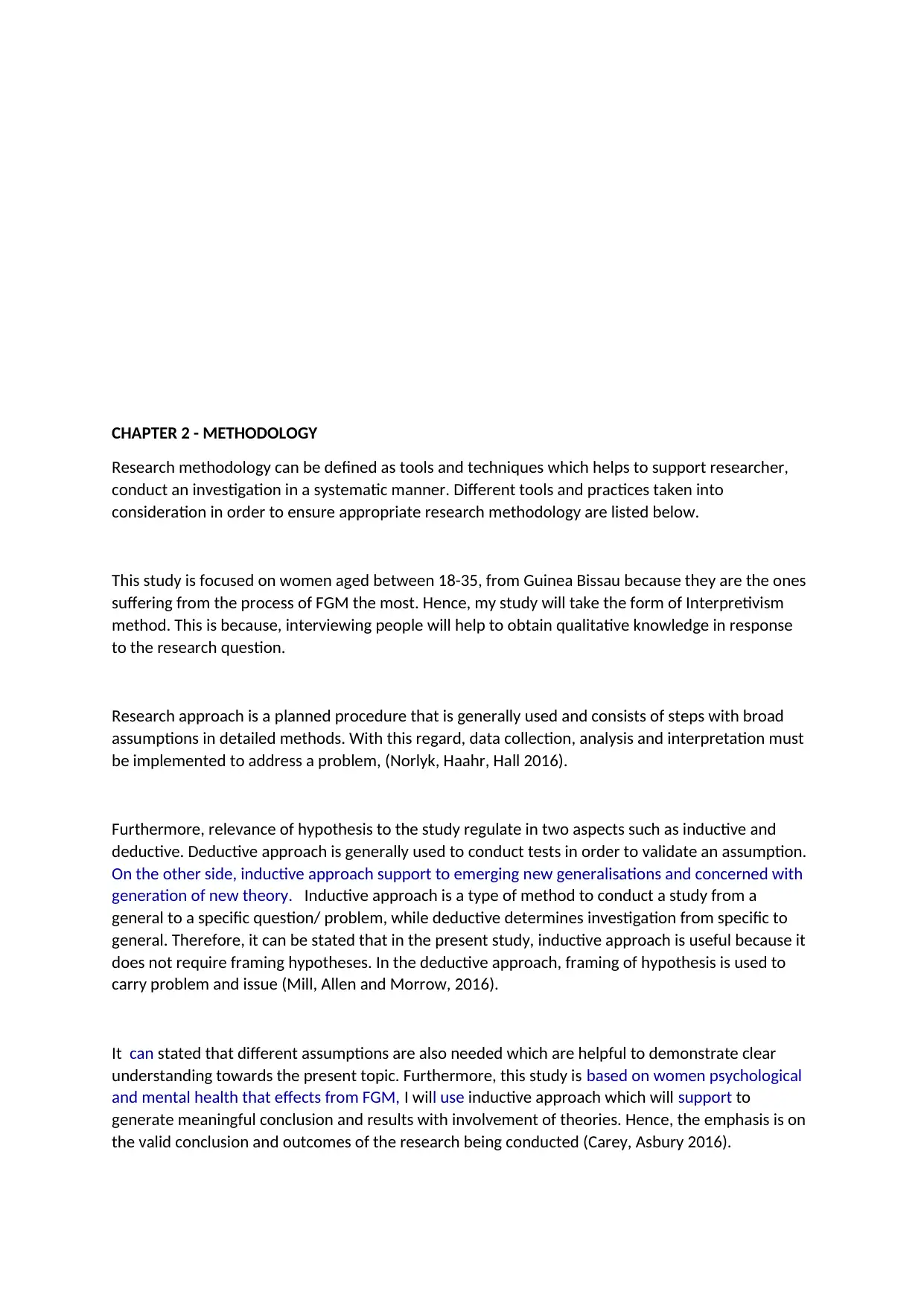
CHAPTER 2 - METHODOLOGY
Research methodology can be defined as tools and techniques which helps to support researcher,
conduct an investigation in a systematic manner. Different tools and practices taken into
consideration in order to ensure appropriate research methodology are listed below.
This study is focused on women aged between 18-35, from Guinea Bissau because they are the ones
suffering from the process of FGM the most. Hence, my study will take the form of Interpretivism
method. This is because, interviewing people will help to obtain qualitative knowledge in response
to the research question.
Research approach is a planned procedure that is generally used and consists of steps with broad
assumptions in detailed methods. With this regard, data collection, analysis and interpretation must
be implemented to address a problem, (Norlyk, Haahr, Hall 2016).
Furthermore, relevance of hypothesis to the study regulate in two aspects such as inductive and
deductive. Deductive approach is generally used to conduct tests in order to validate an assumption.
On the other side, inductive approach support to emerging new generalisations and concerned with
generation of new theory. Inductive approach is a type of method to conduct a study from a
general to a specific question/ problem, while deductive determines investigation from specific to
general. Therefore, it can be stated that in the present study, inductive approach is useful because it
does not require framing hypotheses. In the deductive approach, framing of hypothesis is used to
carry problem and issue (Mill, Allen and Morrow, 2016).
It can stated that different assumptions are also needed which are helpful to demonstrate clear
understanding towards the present topic. Furthermore, this study is based on women psychological
and mental health that effects from FGM, I will use inductive approach which will support to
generate meaningful conclusion and results with involvement of theories. Hence, the emphasis is on
the valid conclusion and outcomes of the research being conducted (Carey, Asbury 2016).
Research methodology can be defined as tools and techniques which helps to support researcher,
conduct an investigation in a systematic manner. Different tools and practices taken into
consideration in order to ensure appropriate research methodology are listed below.
This study is focused on women aged between 18-35, from Guinea Bissau because they are the ones
suffering from the process of FGM the most. Hence, my study will take the form of Interpretivism
method. This is because, interviewing people will help to obtain qualitative knowledge in response
to the research question.
Research approach is a planned procedure that is generally used and consists of steps with broad
assumptions in detailed methods. With this regard, data collection, analysis and interpretation must
be implemented to address a problem, (Norlyk, Haahr, Hall 2016).
Furthermore, relevance of hypothesis to the study regulate in two aspects such as inductive and
deductive. Deductive approach is generally used to conduct tests in order to validate an assumption.
On the other side, inductive approach support to emerging new generalisations and concerned with
generation of new theory. Inductive approach is a type of method to conduct a study from a
general to a specific question/ problem, while deductive determines investigation from specific to
general. Therefore, it can be stated that in the present study, inductive approach is useful because it
does not require framing hypotheses. In the deductive approach, framing of hypothesis is used to
carry problem and issue (Mill, Allen and Morrow, 2016).
It can stated that different assumptions are also needed which are helpful to demonstrate clear
understanding towards the present topic. Furthermore, this study is based on women psychological
and mental health that effects from FGM, I will use inductive approach which will support to
generate meaningful conclusion and results with involvement of theories. Hence, the emphasis is on
the valid conclusion and outcomes of the research being conducted (Carey, Asbury 2016).
Paraphrase This Document
Need a fresh take? Get an instant paraphrase of this document with our AI Paraphraser
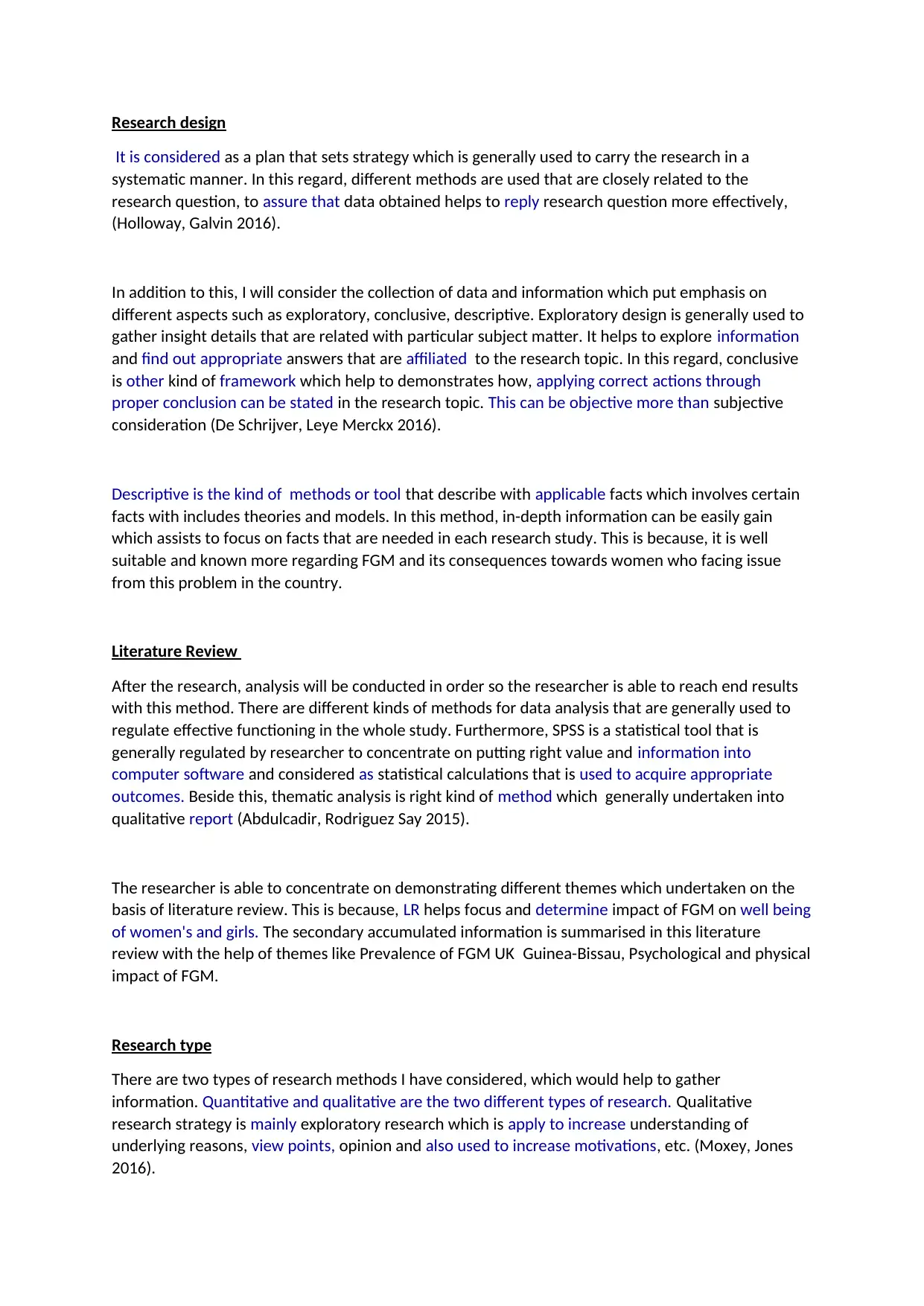
Research design
It is considered as a plan that sets strategy which is generally used to carry the research in a
systematic manner. In this regard, different methods are used that are closely related to the
research question, to assure that data obtained helps to reply research question more effectively,
(Holloway, Galvin 2016).
In addition to this, I will consider the collection of data and information which put emphasis on
different aspects such as exploratory, conclusive, descriptive. Exploratory design is generally used to
gather insight details that are related with particular subject matter. It helps to explore information
and find out appropriate answers that are affiliated to the research topic. In this regard, conclusive
is other kind of framework which help to demonstrates how, applying correct actions through
proper conclusion can be stated in the research topic. This can be objective more than subjective
consideration (De Schrijver, Leye Merckx 2016).
Descriptive is the kind of methods or tool that describe with applicable facts which involves certain
facts with includes theories and models. In this method, in-depth information can be easily gain
which assists to focus on facts that are needed in each research study. This is because, it is well
suitable and known more regarding FGM and its consequences towards women who facing issue
from this problem in the country.
Literature Review
After the research, analysis will be conducted in order so the researcher is able to reach end results
with this method. There are different kinds of methods for data analysis that are generally used to
regulate effective functioning in the whole study. Furthermore, SPSS is a statistical tool that is
generally regulated by researcher to concentrate on putting right value and information into
computer software and considered as statistical calculations that is used to acquire appropriate
outcomes. Beside this, thematic analysis is right kind of method which generally undertaken into
qualitative report (Abdulcadir, Rodriguez Say 2015).
The researcher is able to concentrate on demonstrating different themes which undertaken on the
basis of literature review. This is because, LR helps focus and determine impact of FGM on well being
of women's and girls. The secondary accumulated information is summarised in this literature
review with the help of themes like Prevalence of FGM UK Guinea-Bissau, Psychological and physical
impact of FGM.
Research type
There are two types of research methods I have considered, which would help to gather
information. Quantitative and qualitative are the two different types of research. Qualitative
research strategy is mainly exploratory research which is apply to increase understanding of
underlying reasons, view points, opinion and also used to increase motivations, etc. (Moxey, Jones
2016).
It is considered as a plan that sets strategy which is generally used to carry the research in a
systematic manner. In this regard, different methods are used that are closely related to the
research question, to assure that data obtained helps to reply research question more effectively,
(Holloway, Galvin 2016).
In addition to this, I will consider the collection of data and information which put emphasis on
different aspects such as exploratory, conclusive, descriptive. Exploratory design is generally used to
gather insight details that are related with particular subject matter. It helps to explore information
and find out appropriate answers that are affiliated to the research topic. In this regard, conclusive
is other kind of framework which help to demonstrates how, applying correct actions through
proper conclusion can be stated in the research topic. This can be objective more than subjective
consideration (De Schrijver, Leye Merckx 2016).
Descriptive is the kind of methods or tool that describe with applicable facts which involves certain
facts with includes theories and models. In this method, in-depth information can be easily gain
which assists to focus on facts that are needed in each research study. This is because, it is well
suitable and known more regarding FGM and its consequences towards women who facing issue
from this problem in the country.
Literature Review
After the research, analysis will be conducted in order so the researcher is able to reach end results
with this method. There are different kinds of methods for data analysis that are generally used to
regulate effective functioning in the whole study. Furthermore, SPSS is a statistical tool that is
generally regulated by researcher to concentrate on putting right value and information into
computer software and considered as statistical calculations that is used to acquire appropriate
outcomes. Beside this, thematic analysis is right kind of method which generally undertaken into
qualitative report (Abdulcadir, Rodriguez Say 2015).
The researcher is able to concentrate on demonstrating different themes which undertaken on the
basis of literature review. This is because, LR helps focus and determine impact of FGM on well being
of women's and girls. The secondary accumulated information is summarised in this literature
review with the help of themes like Prevalence of FGM UK Guinea-Bissau, Psychological and physical
impact of FGM.
Research type
There are two types of research methods I have considered, which would help to gather
information. Quantitative and qualitative are the two different types of research. Qualitative
research strategy is mainly exploratory research which is apply to increase understanding of
underlying reasons, view points, opinion and also used to increase motivations, etc. (Moxey, Jones
2016).
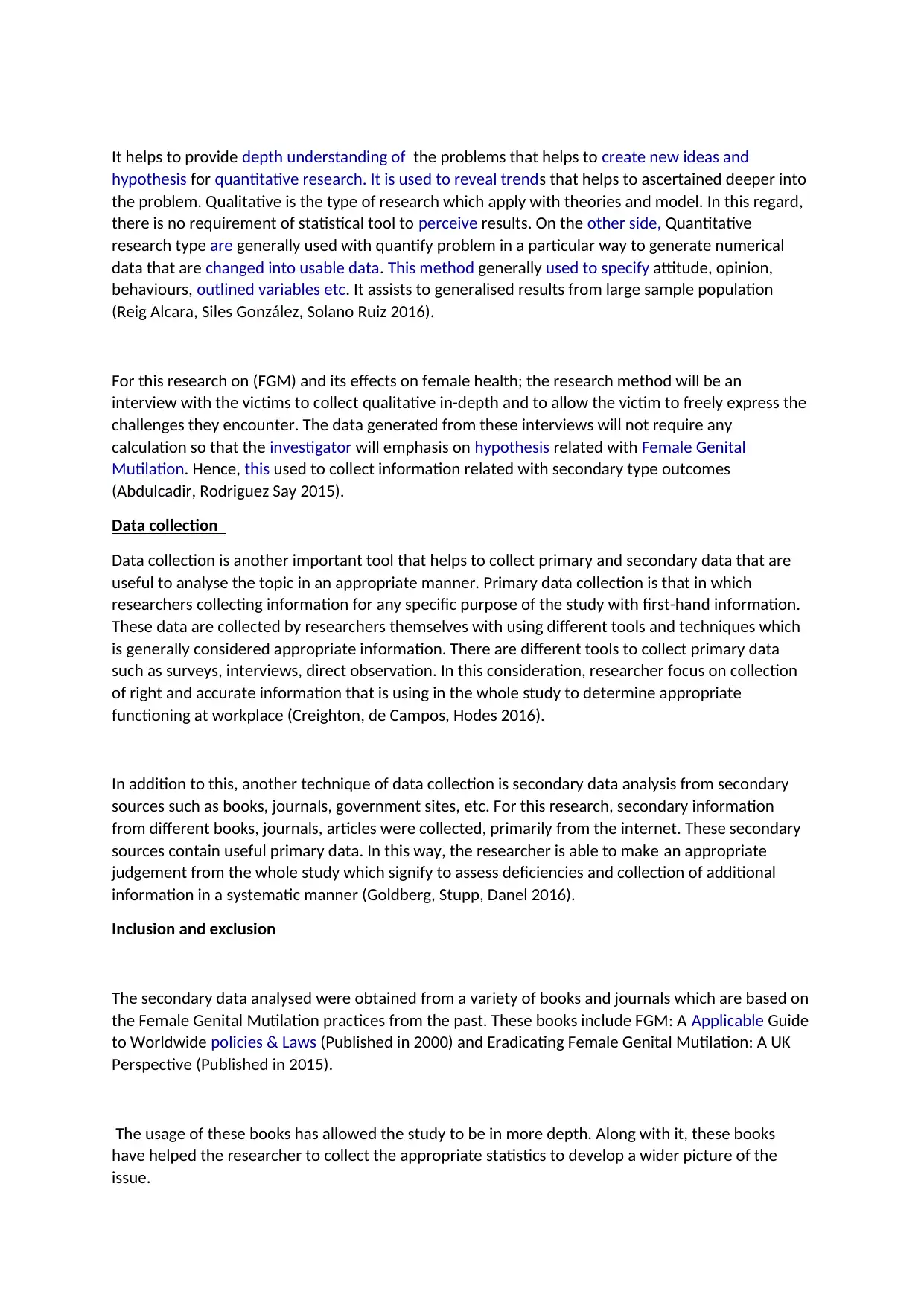
It helps to provide depth understanding of the problems that helps to create new ideas and
hypothesis for quantitative research. It is used to reveal trends that helps to ascertained deeper into
the problem. Qualitative is the type of research which apply with theories and model. In this regard,
there is no requirement of statistical tool to perceive results. On the other side, Quantitative
research type are generally used with quantify problem in a particular way to generate numerical
data that are changed into usable data. This method generally used to specify attitude, opinion,
behaviours, outlined variables etc. It assists to generalised results from large sample population
(Reig Alcara, Siles González, Solano Ruiz 2016).
For this research on (FGM) and its effects on female health; the research method will be an
interview with the victims to collect qualitative in-depth and to allow the victim to freely express the
challenges they encounter. The data generated from these interviews will not require any
calculation so that the investigator will emphasis on hypothesis related with Female Genital
Mutilation. Hence, this used to collect information related with secondary type outcomes
(Abdulcadir, Rodriguez Say 2015).
Data collection
Data collection is another important tool that helps to collect primary and secondary data that are
useful to analyse the topic in an appropriate manner. Primary data collection is that in which
researchers collecting information for any specific purpose of the study with first-hand information.
These data are collected by researchers themselves with using different tools and techniques which
is generally considered appropriate information. There are different tools to collect primary data
such as surveys, interviews, direct observation. In this consideration, researcher focus on collection
of right and accurate information that is using in the whole study to determine appropriate
functioning at workplace (Creighton, de Campos, Hodes 2016).
In addition to this, another technique of data collection is secondary data analysis from secondary
sources such as books, journals, government sites, etc. For this research, secondary information
from different books, journals, articles were collected, primarily from the internet. These secondary
sources contain useful primary data. In this way, the researcher is able to make an appropriate
judgement from the whole study which signify to assess deficiencies and collection of additional
information in a systematic manner (Goldberg, Stupp, Danel 2016).
Inclusion and exclusion
The secondary data analysed were obtained from a variety of books and journals which are based on
the Female Genital Mutilation practices from the past. These books include FGM: A Applicable Guide
to Worldwide policies & Laws (Published in 2000) and Eradicating Female Genital Mutilation: A UK
Perspective (Published in 2015).
The usage of these books has allowed the study to be in more depth. Along with it, these books
have helped the researcher to collect the appropriate statistics to develop a wider picture of the
issue.
hypothesis for quantitative research. It is used to reveal trends that helps to ascertained deeper into
the problem. Qualitative is the type of research which apply with theories and model. In this regard,
there is no requirement of statistical tool to perceive results. On the other side, Quantitative
research type are generally used with quantify problem in a particular way to generate numerical
data that are changed into usable data. This method generally used to specify attitude, opinion,
behaviours, outlined variables etc. It assists to generalised results from large sample population
(Reig Alcara, Siles González, Solano Ruiz 2016).
For this research on (FGM) and its effects on female health; the research method will be an
interview with the victims to collect qualitative in-depth and to allow the victim to freely express the
challenges they encounter. The data generated from these interviews will not require any
calculation so that the investigator will emphasis on hypothesis related with Female Genital
Mutilation. Hence, this used to collect information related with secondary type outcomes
(Abdulcadir, Rodriguez Say 2015).
Data collection
Data collection is another important tool that helps to collect primary and secondary data that are
useful to analyse the topic in an appropriate manner. Primary data collection is that in which
researchers collecting information for any specific purpose of the study with first-hand information.
These data are collected by researchers themselves with using different tools and techniques which
is generally considered appropriate information. There are different tools to collect primary data
such as surveys, interviews, direct observation. In this consideration, researcher focus on collection
of right and accurate information that is using in the whole study to determine appropriate
functioning at workplace (Creighton, de Campos, Hodes 2016).
In addition to this, another technique of data collection is secondary data analysis from secondary
sources such as books, journals, government sites, etc. For this research, secondary information
from different books, journals, articles were collected, primarily from the internet. These secondary
sources contain useful primary data. In this way, the researcher is able to make an appropriate
judgement from the whole study which signify to assess deficiencies and collection of additional
information in a systematic manner (Goldberg, Stupp, Danel 2016).
Inclusion and exclusion
The secondary data analysed were obtained from a variety of books and journals which are based on
the Female Genital Mutilation practices from the past. These books include FGM: A Applicable Guide
to Worldwide policies & Laws (Published in 2000) and Eradicating Female Genital Mutilation: A UK
Perspective (Published in 2015).
The usage of these books has allowed the study to be in more depth. Along with it, these books
have helped the researcher to collect the appropriate statistics to develop a wider picture of the
issue.
⊘ This is a preview!⊘
Do you want full access?
Subscribe today to unlock all pages.

Trusted by 1+ million students worldwide
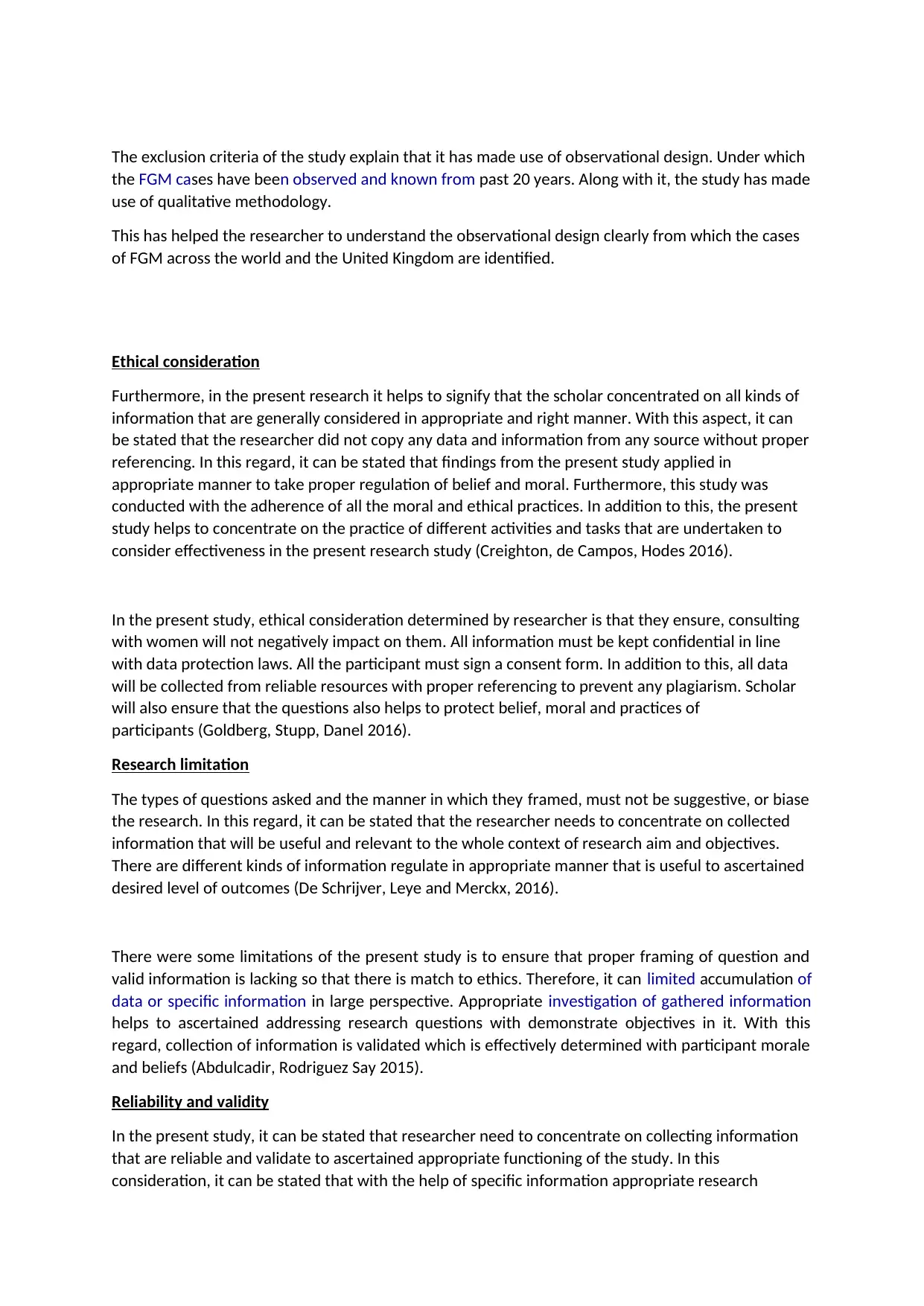
The exclusion criteria of the study explain that it has made use of observational design. Under which
the FGM cases have been observed and known from past 20 years. Along with it, the study has made
use of qualitative methodology.
This has helped the researcher to understand the observational design clearly from which the cases
of FGM across the world and the United Kingdom are identified.
Ethical consideration
Furthermore, in the present research it helps to signify that the scholar concentrated on all kinds of
information that are generally considered in appropriate and right manner. With this aspect, it can
be stated that the researcher did not copy any data and information from any source without proper
referencing. In this regard, it can be stated that findings from the present study applied in
appropriate manner to take proper regulation of belief and moral. Furthermore, this study was
conducted with the adherence of all the moral and ethical practices. In addition to this, the present
study helps to concentrate on the practice of different activities and tasks that are undertaken to
consider effectiveness in the present research study (Creighton, de Campos, Hodes 2016).
In the present study, ethical consideration determined by researcher is that they ensure, consulting
with women will not negatively impact on them. All information must be kept confidential in line
with data protection laws. All the participant must sign a consent form. In addition to this, all data
will be collected from reliable resources with proper referencing to prevent any plagiarism. Scholar
will also ensure that the questions also helps to protect belief, moral and practices of
participants (Goldberg, Stupp, Danel 2016).
Research limitation
The types of questions asked and the manner in which they framed, must not be suggestive, or biase
the research. In this regard, it can be stated that the researcher needs to concentrate on collected
information that will be useful and relevant to the whole context of research aim and objectives.
There are different kinds of information regulate in appropriate manner that is useful to ascertained
desired level of outcomes (De Schrijver, Leye and Merckx, 2016).
There were some limitations of the present study is to ensure that proper framing of question and
valid information is lacking so that there is match to ethics. Therefore, it can limited accumulation of
data or specific information in large perspective. Appropriate investigation of gathered information
helps to ascertained addressing research questions with demonstrate objectives in it. With this
regard, collection of information is validated which is effectively determined with participant morale
and beliefs (Abdulcadir, Rodriguez Say 2015).
Reliability and validity
In the present study, it can be stated that researcher need to concentrate on collecting information
that are reliable and validate to ascertained appropriate functioning of the study. In this
consideration, it can be stated that with the help of specific information appropriate research
the FGM cases have been observed and known from past 20 years. Along with it, the study has made
use of qualitative methodology.
This has helped the researcher to understand the observational design clearly from which the cases
of FGM across the world and the United Kingdom are identified.
Ethical consideration
Furthermore, in the present research it helps to signify that the scholar concentrated on all kinds of
information that are generally considered in appropriate and right manner. With this aspect, it can
be stated that the researcher did not copy any data and information from any source without proper
referencing. In this regard, it can be stated that findings from the present study applied in
appropriate manner to take proper regulation of belief and moral. Furthermore, this study was
conducted with the adherence of all the moral and ethical practices. In addition to this, the present
study helps to concentrate on the practice of different activities and tasks that are undertaken to
consider effectiveness in the present research study (Creighton, de Campos, Hodes 2016).
In the present study, ethical consideration determined by researcher is that they ensure, consulting
with women will not negatively impact on them. All information must be kept confidential in line
with data protection laws. All the participant must sign a consent form. In addition to this, all data
will be collected from reliable resources with proper referencing to prevent any plagiarism. Scholar
will also ensure that the questions also helps to protect belief, moral and practices of
participants (Goldberg, Stupp, Danel 2016).
Research limitation
The types of questions asked and the manner in which they framed, must not be suggestive, or biase
the research. In this regard, it can be stated that the researcher needs to concentrate on collected
information that will be useful and relevant to the whole context of research aim and objectives.
There are different kinds of information regulate in appropriate manner that is useful to ascertained
desired level of outcomes (De Schrijver, Leye and Merckx, 2016).
There were some limitations of the present study is to ensure that proper framing of question and
valid information is lacking so that there is match to ethics. Therefore, it can limited accumulation of
data or specific information in large perspective. Appropriate investigation of gathered information
helps to ascertained addressing research questions with demonstrate objectives in it. With this
regard, collection of information is validated which is effectively determined with participant morale
and beliefs (Abdulcadir, Rodriguez Say 2015).
Reliability and validity
In the present study, it can be stated that researcher need to concentrate on collecting information
that are reliable and validate to ascertained appropriate functioning of the study. In this
consideration, it can be stated that with the help of specific information appropriate research
Paraphrase This Document
Need a fresh take? Get an instant paraphrase of this document with our AI Paraphraser
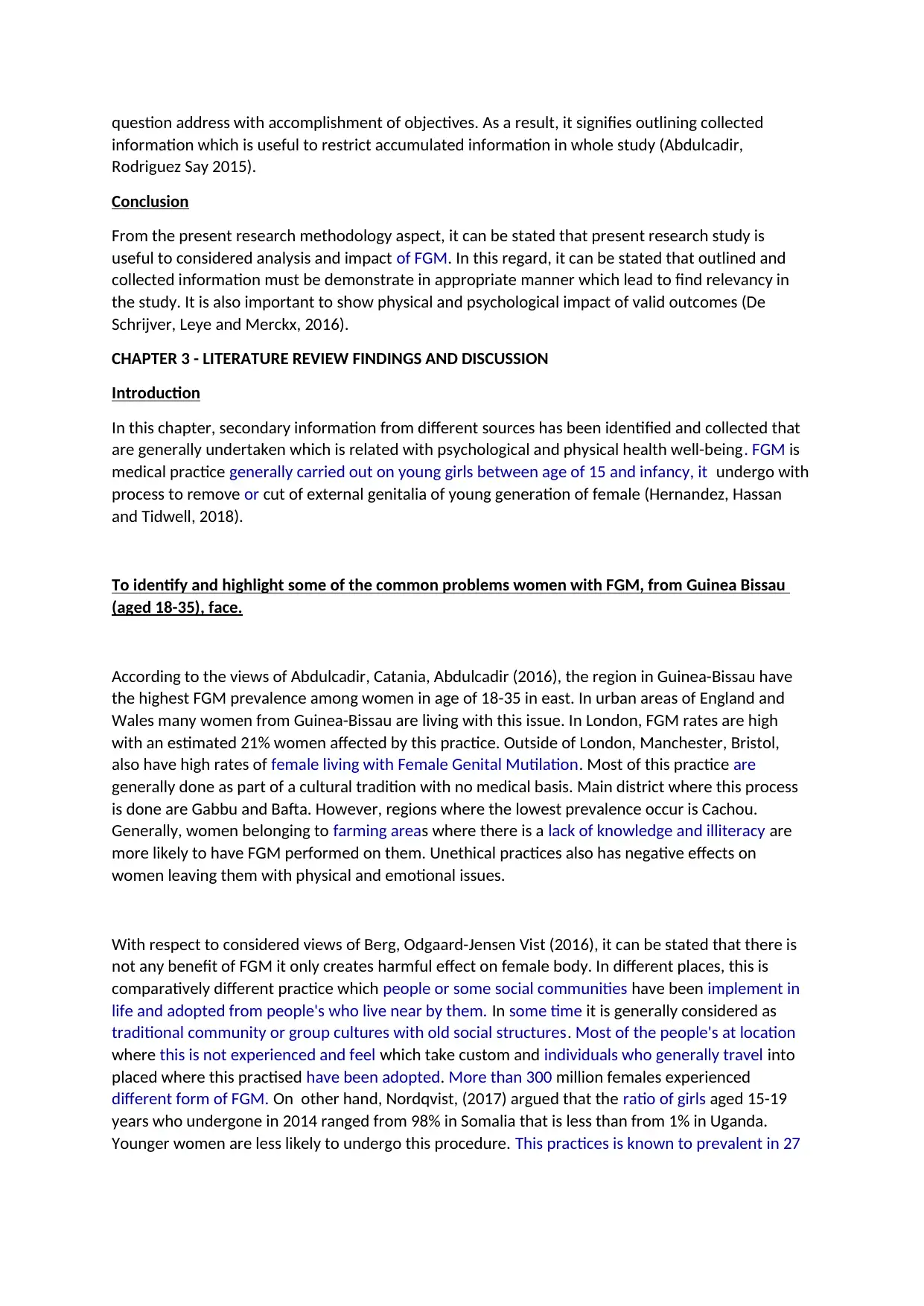
question address with accomplishment of objectives. As a result, it signifies outlining collected
information which is useful to restrict accumulated information in whole study (Abdulcadir,
Rodriguez Say 2015).
Conclusion
From the present research methodology aspect, it can be stated that present research study is
useful to considered analysis and impact of FGM. In this regard, it can be stated that outlined and
collected information must be demonstrate in appropriate manner which lead to find relevancy in
the study. It is also important to show physical and psychological impact of valid outcomes (De
Schrijver, Leye and Merckx, 2016).
CHAPTER 3 - LITERATURE REVIEW FINDINGS AND DISCUSSION
Introduction
In this chapter, secondary information from different sources has been identified and collected that
are generally undertaken which is related with psychological and physical health well-being. FGM is
medical practice generally carried out on young girls between age of 15 and infancy, it undergo with
process to remove or cut of external genitalia of young generation of female (Hernandez, Hassan
and Tidwell, 2018).
To identify and highlight some of the common problems women with FGM, from Guinea Bissau
(aged 18-35), face.
According to the views of Abdulcadir, Catania, Abdulcadir (2016), the region in Guinea-Bissau have
the highest FGM prevalence among women in age of 18-35 in east. In urban areas of England and
Wales many women from Guinea-Bissau are living with this issue. In London, FGM rates are high
with an estimated 21% women affected by this practice. Outside of London, Manchester, Bristol,
also have high rates of female living with Female Genital Mutilation. Most of this practice are
generally done as part of a cultural tradition with no medical basis. Main district where this process
is done are Gabbu and Bafta. However, regions where the lowest prevalence occur is Cachou.
Generally, women belonging to farming areas where there is a lack of knowledge and illiteracy are
more likely to have FGM performed on them. Unethical practices also has negative effects on
women leaving them with physical and emotional issues.
With respect to considered views of Berg, Odgaard-Jensen Vist (2016), it can be stated that there is
not any benefit of FGM it only creates harmful effect on female body. In different places, this is
comparatively different practice which people or some social communities have been implement in
life and adopted from people's who live near by them. In some time it is generally considered as
traditional community or group cultures with old social structures. Most of the people's at location
where this is not experienced and feel which take custom and individuals who generally travel into
placed where this practised have been adopted. More than 300 million females experienced
different form of FGM. On other hand, Nordqvist, (2017) argued that the ratio of girls aged 15-19
years who undergone in 2014 ranged from 98% in Somalia that is less than from 1% in Uganda.
Younger women are less likely to undergo this procedure. This practices is known to prevalent in 27
information which is useful to restrict accumulated information in whole study (Abdulcadir,
Rodriguez Say 2015).
Conclusion
From the present research methodology aspect, it can be stated that present research study is
useful to considered analysis and impact of FGM. In this regard, it can be stated that outlined and
collected information must be demonstrate in appropriate manner which lead to find relevancy in
the study. It is also important to show physical and psychological impact of valid outcomes (De
Schrijver, Leye and Merckx, 2016).
CHAPTER 3 - LITERATURE REVIEW FINDINGS AND DISCUSSION
Introduction
In this chapter, secondary information from different sources has been identified and collected that
are generally undertaken which is related with psychological and physical health well-being. FGM is
medical practice generally carried out on young girls between age of 15 and infancy, it undergo with
process to remove or cut of external genitalia of young generation of female (Hernandez, Hassan
and Tidwell, 2018).
To identify and highlight some of the common problems women with FGM, from Guinea Bissau
(aged 18-35), face.
According to the views of Abdulcadir, Catania, Abdulcadir (2016), the region in Guinea-Bissau have
the highest FGM prevalence among women in age of 18-35 in east. In urban areas of England and
Wales many women from Guinea-Bissau are living with this issue. In London, FGM rates are high
with an estimated 21% women affected by this practice. Outside of London, Manchester, Bristol,
also have high rates of female living with Female Genital Mutilation. Most of this practice are
generally done as part of a cultural tradition with no medical basis. Main district where this process
is done are Gabbu and Bafta. However, regions where the lowest prevalence occur is Cachou.
Generally, women belonging to farming areas where there is a lack of knowledge and illiteracy are
more likely to have FGM performed on them. Unethical practices also has negative effects on
women leaving them with physical and emotional issues.
With respect to considered views of Berg, Odgaard-Jensen Vist (2016), it can be stated that there is
not any benefit of FGM it only creates harmful effect on female body. In different places, this is
comparatively different practice which people or some social communities have been implement in
life and adopted from people's who live near by them. In some time it is generally considered as
traditional community or group cultures with old social structures. Most of the people's at location
where this is not experienced and feel which take custom and individuals who generally travel into
placed where this practised have been adopted. More than 300 million females experienced
different form of FGM. On other hand, Nordqvist, (2017) argued that the ratio of girls aged 15-19
years who undergone in 2014 ranged from 98% in Somalia that is less than from 1% in Uganda.
Younger women are less likely to undergo this procedure. This practices is known to prevalent in 27
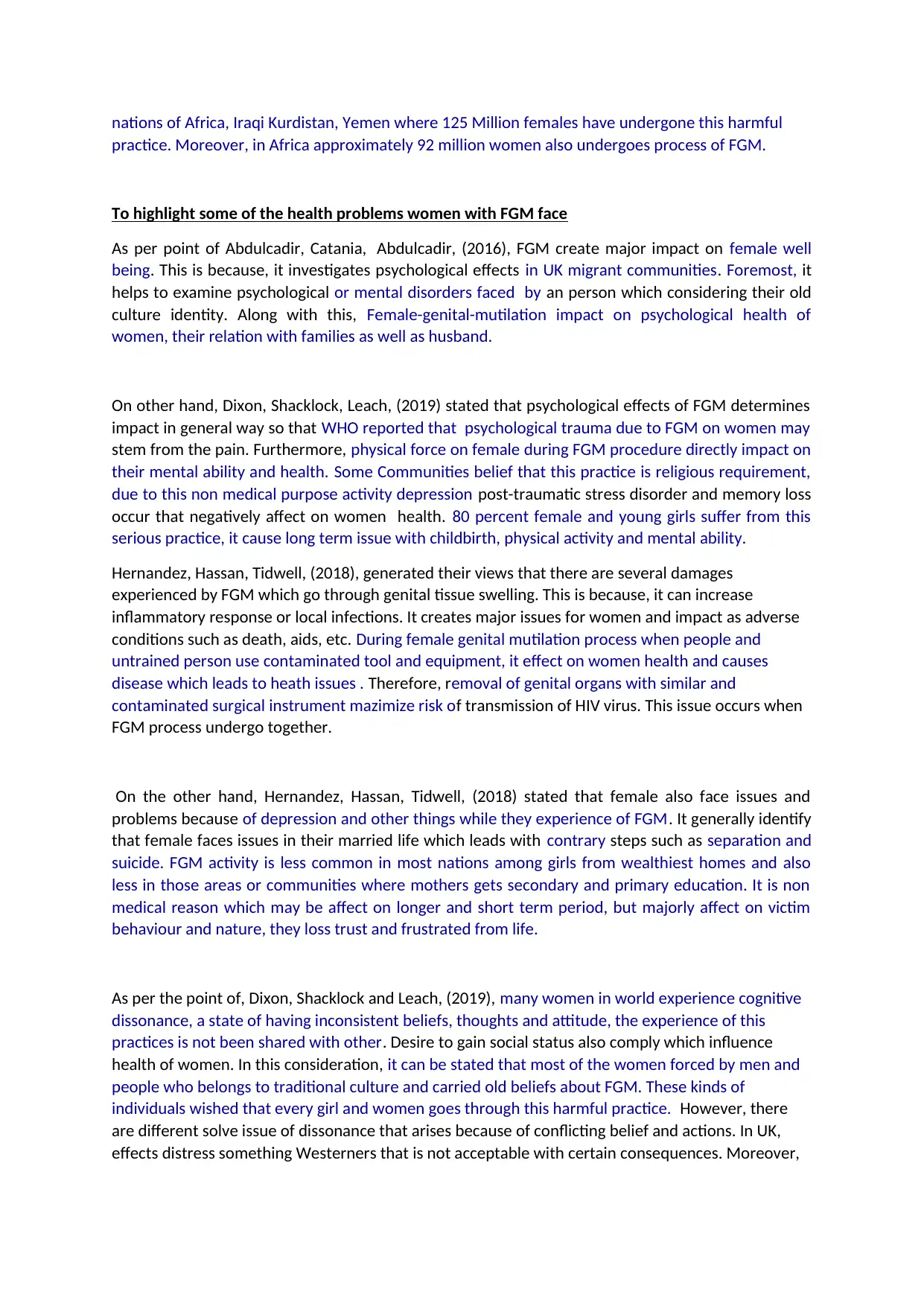
nations of Africa, Iraqi Kurdistan, Yemen where 125 Million females have undergone this harmful
practice. Moreover, in Africa approximately 92 million women also undergoes process of FGM.
To highlight some of the health problems women with FGM face
As per point of Abdulcadir, Catania, Abdulcadir, (2016), FGM create major impact on female well
being. This is because, it investigates psychological effects in UK migrant communities. Foremost, it
helps to examine psychological or mental disorders faced by an person which considering their old
culture identity. Along with this, Female-genital-mutilation impact on psychological health of
women, their relation with families as well as husband.
On other hand, Dixon, Shacklock, Leach, (2019) stated that psychological effects of FGM determines
impact in general way so that WHO reported that psychological trauma due to FGM on women may
stem from the pain. Furthermore, physical force on female during FGM procedure directly impact on
their mental ability and health. Some Communities belief that this practice is religious requirement,
due to this non medical purpose activity depression post-traumatic stress disorder and memory loss
occur that negatively affect on women health. 80 percent female and young girls suffer from this
serious practice, it cause long term issue with childbirth, physical activity and mental ability.
Hernandez, Hassan, Tidwell, (2018), generated their views that there are several damages
experienced by FGM which go through genital tissue swelling. This is because, it can increase
inflammatory response or local infections. It creates major issues for women and impact as adverse
conditions such as death, aids, etc. During female genital mutilation process when people and
untrained person use contaminated tool and equipment, it effect on women health and causes
disease which leads to heath issues . Therefore, removal of genital organs with similar and
contaminated surgical instrument mazimize risk of transmission of HIV virus. This issue occurs when
FGM process undergo together.
On the other hand, Hernandez, Hassan, Tidwell, (2018) stated that female also face issues and
problems because of depression and other things while they experience of FGM. It generally identify
that female faces issues in their married life which leads with contrary steps such as separation and
suicide. FGM activity is less common in most nations among girls from wealthiest homes and also
less in those areas or communities where mothers gets secondary and primary education. It is non
medical reason which may be affect on longer and short term period, but majorly affect on victim
behaviour and nature, they loss trust and frustrated from life.
As per the point of, Dixon, Shacklock and Leach, (2019), many women in world experience cognitive
dissonance, a state of having inconsistent beliefs, thoughts and attitude, the experience of this
practices is not been shared with other. Desire to gain social status also comply which influence
health of women. In this consideration, it can be stated that most of the women forced by men and
people who belongs to traditional culture and carried old beliefs about FGM. These kinds of
individuals wished that every girl and women goes through this harmful practice. However, there
are different solve issue of dissonance that arises because of conflicting belief and actions. In UK,
effects distress something Westerners that is not acceptable with certain consequences. Moreover,
practice. Moreover, in Africa approximately 92 million women also undergoes process of FGM.
To highlight some of the health problems women with FGM face
As per point of Abdulcadir, Catania, Abdulcadir, (2016), FGM create major impact on female well
being. This is because, it investigates psychological effects in UK migrant communities. Foremost, it
helps to examine psychological or mental disorders faced by an person which considering their old
culture identity. Along with this, Female-genital-mutilation impact on psychological health of
women, their relation with families as well as husband.
On other hand, Dixon, Shacklock, Leach, (2019) stated that psychological effects of FGM determines
impact in general way so that WHO reported that psychological trauma due to FGM on women may
stem from the pain. Furthermore, physical force on female during FGM procedure directly impact on
their mental ability and health. Some Communities belief that this practice is religious requirement,
due to this non medical purpose activity depression post-traumatic stress disorder and memory loss
occur that negatively affect on women health. 80 percent female and young girls suffer from this
serious practice, it cause long term issue with childbirth, physical activity and mental ability.
Hernandez, Hassan, Tidwell, (2018), generated their views that there are several damages
experienced by FGM which go through genital tissue swelling. This is because, it can increase
inflammatory response or local infections. It creates major issues for women and impact as adverse
conditions such as death, aids, etc. During female genital mutilation process when people and
untrained person use contaminated tool and equipment, it effect on women health and causes
disease which leads to heath issues . Therefore, removal of genital organs with similar and
contaminated surgical instrument mazimize risk of transmission of HIV virus. This issue occurs when
FGM process undergo together.
On the other hand, Hernandez, Hassan, Tidwell, (2018) stated that female also face issues and
problems because of depression and other things while they experience of FGM. It generally identify
that female faces issues in their married life which leads with contrary steps such as separation and
suicide. FGM activity is less common in most nations among girls from wealthiest homes and also
less in those areas or communities where mothers gets secondary and primary education. It is non
medical reason which may be affect on longer and short term period, but majorly affect on victim
behaviour and nature, they loss trust and frustrated from life.
As per the point of, Dixon, Shacklock and Leach, (2019), many women in world experience cognitive
dissonance, a state of having inconsistent beliefs, thoughts and attitude, the experience of this
practices is not been shared with other. Desire to gain social status also comply which influence
health of women. In this consideration, it can be stated that most of the women forced by men and
people who belongs to traditional culture and carried old beliefs about FGM. These kinds of
individuals wished that every girl and women goes through this harmful practice. However, there
are different solve issue of dissonance that arises because of conflicting belief and actions. In UK,
effects distress something Westerners that is not acceptable with certain consequences. Moreover,
⊘ This is a preview!⊘
Do you want full access?
Subscribe today to unlock all pages.

Trusted by 1+ million students worldwide
1 out of 23
Related Documents
Your All-in-One AI-Powered Toolkit for Academic Success.
+13062052269
info@desklib.com
Available 24*7 on WhatsApp / Email
![[object Object]](/_next/static/media/star-bottom.7253800d.svg)
Unlock your academic potential
Copyright © 2020–2026 A2Z Services. All Rights Reserved. Developed and managed by ZUCOL.




